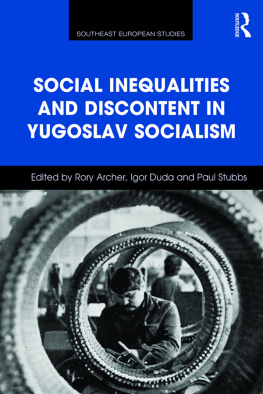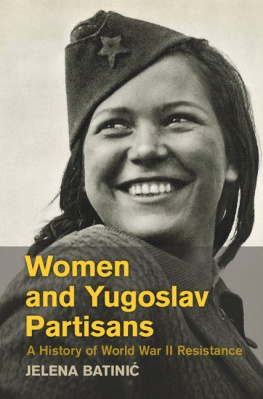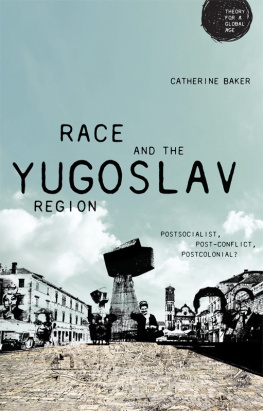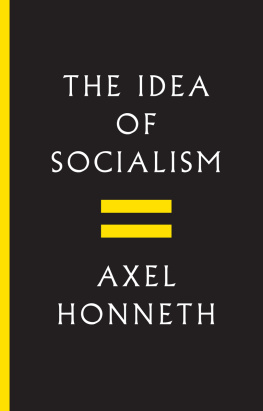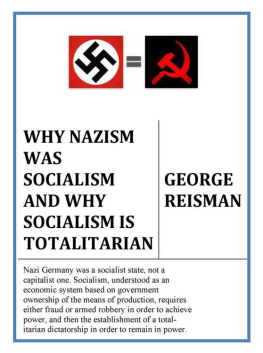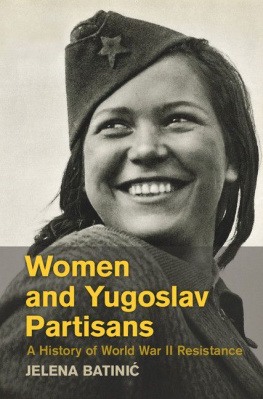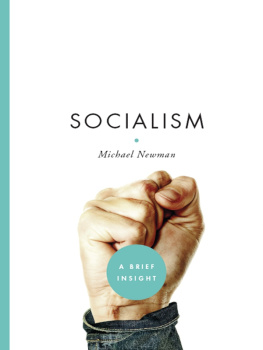Archer Rory - Social Inequalities and Discontent in Yugoslav Socialism
Here you can read online Archer Rory - Social Inequalities and Discontent in Yugoslav Socialism full text of the book (entire story) in english for free. Download pdf and epub, get meaning, cover and reviews about this ebook. City: Farnham;Surrey, year: 2016, publisher: Taylor and Francis;Ashgate, genre: Politics. Description of the work, (preface) as well as reviews are available. Best literature library LitArk.com created for fans of good reading and offers a wide selection of genres:
Romance novel
Science fiction
Adventure
Detective
Science
History
Home and family
Prose
Art
Politics
Computer
Non-fiction
Religion
Business
Children
Humor
Choose a favorite category and find really read worthwhile books. Enjoy immersion in the world of imagination, feel the emotions of the characters or learn something new for yourself, make an fascinating discovery.
- Book:Social Inequalities and Discontent in Yugoslav Socialism
- Author:
- Publisher:Taylor and Francis;Ashgate
- Genre:
- Year:2016
- City:Farnham;Surrey
- Rating:3 / 5
- Favourites:Add to favourites
- Your mark:
- 60
- 1
- 2
- 3
- 4
- 5
Social Inequalities and Discontent in Yugoslav Socialism: summary, description and annotation
We offer to read an annotation, description, summary or preface (depends on what the author of the book "Social Inequalities and Discontent in Yugoslav Socialism" wrote himself). If you haven't found the necessary information about the book — write in the comments, we will try to find it.
Archer Rory: author's other books
Who wrote Social Inequalities and Discontent in Yugoslav Socialism? Find out the surname, the name of the author of the book and a list of all author's works by series.
Social Inequalities and Discontent in Yugoslav Socialism — read online for free the complete book (whole text) full work
Below is the text of the book, divided by pages. System saving the place of the last page read, allows you to conveniently read the book "Social Inequalities and Discontent in Yugoslav Socialism" online for free, without having to search again every time where you left off. Put a bookmark, and you can go to the page where you finished reading at any time.
Font size:
Interval:
Bookmark:
First published 2016
by Routledge
2 Park Square, Milton Park, Abingdon, Oxon OX14 4RN
and by Routledge
711 Third Avenue, New York, NY 10017
Routledge is an imprint of the Taylor & Francis Group, an informa business
2016 selection and editorial matter, Rory Archer, Igor Duda and Paul Stubbs; individual chapters, the contributors
Typeset in Times New Roman
by Apex CoVantage, LLC
The right of Rory Archer, Igor Duda and Paul Stubbs to be identified as the author of the editorial material, and of the authors for their individual chapters, has been asserted in accordance with sections 77 and 78 of the Copyright, Designs and Patents Act 1988.
All rights reserved. No part of this book may be reprinted or reproduced or utilised in any form or by any electronic, mechanical, or other means, now known or hereafter invented, including photocopying and recording, or in any information storage or retrieval system, without permission in writing from the publishers.
Trademark notice: Product or corporate names may be trademarks or registered trademarks, and are used only for identification and explanation without intent to infringe.
British Library Cataloguing in Publication Data
A catalogue record for this book is available from the British Library
Library of Congress Cataloging-in-Publication Data
Social inequalities and discontent in Yugoslav socialism / by Rory
Archer, Igor Duda and Paul Stubbs.
pages cm. (Southeast European studies)
Includes bibliographical references and index.
ISBN 978-1-4724-5954-1 (hardback : alk. paper)
ISBN 978-1-4724-5955-8 (ebook)ISBN 978-1-4724-5956-5 (epub)
1. Equality-Yugoslavia. 2. Socialism-Yugoslavia. 3. Yugoslavia
Social conditions. I. Archer, Rory, editor. II. Duda, Igor, 1977
editor. III. Stubbs, Paul, 1959 editor.
HN632.5.S63 2016
306.09497dc23
2015030409
ISBN: 978-1-4724-5954-1 (hbk)
ISBN: 978-1-4724-5955-8 (ebkPDF)
ISBN: 978-1-4724-5956-5 (ebkePUB)

Publication was generously supported by the University of Graz

Rory Archer is a researcher at the Centre for Southeast European Studies, University of Graz, where he works on a project funded by the Austrian Science Fund (FWF) Between class and nation. Working class communities in 1980s Serbia and Montenegro. He holds a PhD in history from the University of Graz. His research interests are primarily concerned with the study of labour, nationalism, gender and everyday life in late Yugoslav socialism. Recent publications include Social inequalities and the study of Yugoslavias dissolution in Debating the End of Yugoslavia (edited by F. Bieber, A. Galija and R. Archer, 2014).
Jana Bacevic is a Marie Curie Postdoctoral Researcher at the University of Aarhus, Denmark, working on the EU FP7-funded project Universities in the Knowledge Economy (UNIKE), and a visiting fellow at the University of Bristol, UK. She has a PhD in social anthropology from the University of Belgrade and has held fellowships at the University of Oxford, Central European University in Budapest and the Open Society Archives. Her work is concerned with the politics of knowledge production, universities relationships with the society and subjectivity and agency in academia. Recent publications include From Class to Identity: The Politics of Education Reforms in Former Yugoslavia (Budapest: CEU Press, 2014).
Ana Devi is a political and cultural sociologist who obtained her PhD from the University of California at San Diego, her MA from the Institute of Social Studies in The Hague and a BA in economics from the University of Novi Sad. She currently works at the sociology department in Fatih University, Istanbul. Ana specialises in the sociology and politics of ethnic divisions and nationalism, sociology of intellectuals, gender, social movements, film as a method of conflict analysis and the consequences of Western aid to civil society in the countries of former Yugoslavia.
Igor Duda , PhD in history (University of Zagreb) is Assistant Professor at Juraj Dobrila University of Pula, where he teaches at the Faculty of Humanities and works as a researcher at the Centre for Cultural and Historical Research of Socialism. He is the author of three books (in Croatian): In Pursuit of Well-Being. On History of Leisure and Consumer Society in Croatia in the 1950s and 1960s (2005), Well-Being Found. Everyday Life and Consumer Culture in Croatia in the 1970s and 1980s (2010), and Today when I become a Pioneer. Childhood and the Ideology of Yugoslav Socialism (2015). Other publications include contributions in the volumes Y ugoslavias Sunny Side. A History of Tourism in Socialism, 1950s1980s , eds. H. Grandits and K. Taylor (2010) and Remembering Utopia. The Culture of Everyday Life in Socialist Yugoslavia , eds. B. Luthar and M. Punik (2010).
Ana Hofman is an associate researcher at the Institute of Culture and Memory Studies, Research Centre of the Slovenian Academy of Sciences and Arts in Ljubljana and lecturer at the Faculty of Humanities of University of Nova Gorica. Recent publications include the monograph Staging Socialist Femininity: Gender Politics and Folklore Performance in Serbia (2011).
Brigitte Le Normand is Assistant Professor of history at the University of British Columbia, Okanagan, where she is also actively involved in the urban studies program. Her most recent publication is Designing Titos Capital: Urban Planning, Modernism, and Socialism in Belgrade (2014).
Goran Musi holds a PhD from the Department of History and Civilization at the European University Institute, Florence. He works as a researcher at the Centre for Southeast European Studies, University of Graz, on a project funded by the Austrian Science Fund (FWF), Between class and nation. Working class communities in 1980s Serbia and Montenegro. Recent publications include Yugoslavia: Workers Self-Management as State Paradigm in I. Ness and D. Azzelini (eds) Ours to Master and to Own: Workers Control from the Commune to the Present (2011) and Aus chaotischen Zustnden heraus agieren: das Beispiel Jugoremedija und die Umrisse einer neuen Arbeiterbewegung in Serbien in M. G. Kraft (ed), Soziale Kmpfe in Ex-Jugoslawien (2013).
Julija Sardeli is a Max Weber Postdoctoral Fellow at the European University Institute, where she is researching the position of post-Yugoslav Romani minorities in relation to broader themes of citizenship and migration. She holds a PhD in sociology. Recent publications include Romani Minorities and Uneven Citizenship Access in the Post-Yugoslav Space, Ethnopolitics Vol. 14, No. 2 (2015) and Tracing Antiziganism as Cultural Racism: Before and After the Disintegration of Yugoslavia in T. Agarin (ed.), When Stereotype Meets Prejudice. Antiziganism in European Societies (2014).
Polona Sitar is a PhD student at the department of Ethnology and Cultural Anthropology at the Faculty of Arts, University of Ljubljana, and is employed as a junior researcher at the Institute of Culture and Memory Studies, Research Centre of the Slovenian Academy of Sciences and Arts. In her research she focuses on socio-historical aspects of everyday life of Slovenian women during socialism, through the perspective of consumption. Her research interests also include popular culture, in particular music and reality shows.
Isabel Strhle obtained her PhD at the University of Munich for the dissertation Socialist Yugoslav Rule in Practice in Kosovo, 19451974 and works as lecturer at the Chair of East and South East European History at the University of Regensburg. Recent publications include KLA Veterans Politics and Contentious Citizenship in Kosovo, in M. ivkovi, S. Pavlovi (eds.), The Utility of Fratricide: Political Mythologies, Reconciliations, and the Uncertain Future in the Former Yugoslavia (2013) and Re-inventing Kosovo: Newborn and the Young Europeans, in D. uber, S. Karamani (eds.), Retracing Images. Visual Culture after Yugoslavia (2012).
Next pageFont size:
Interval:
Bookmark:
Similar books «Social Inequalities and Discontent in Yugoslav Socialism»
Look at similar books to Social Inequalities and Discontent in Yugoslav Socialism. We have selected literature similar in name and meaning in the hope of providing readers with more options to find new, interesting, not yet read works.
Discussion, reviews of the book Social Inequalities and Discontent in Yugoslav Socialism and just readers' own opinions. Leave your comments, write what you think about the work, its meaning or the main characters. Specify what exactly you liked and what you didn't like, and why you think so.

